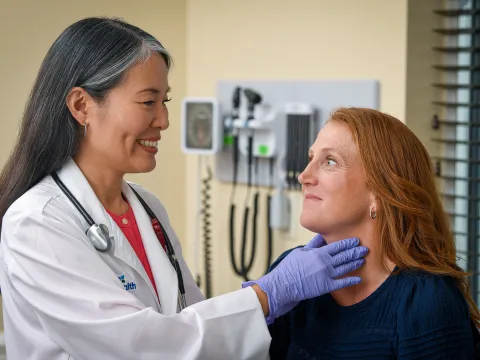- AdventHealth

Choose the health content that’s right for you, and get it delivered right in your inbox.
Your AdventHealth Primary Care+ primary care provider (PCP) is there for you, whether you’re feeling under the weather or need an annual physical exam. Building a long-term relationship with your PCP supports you in creating a life you love throughout every age and stage of life.
But there may come a time when you face a new diagnosis or condition that requires specialized care. That’s when your PCP will refer you to a specialist. For example, if you’re dealing with an ongoing skin issue or need a skin cancer screening, your PCP will refer you to a dermatologist. Or if during your annual well check, your PCP detects a heart murmur or irregular heartbeat, they’ll send you to see a cardiologist.
But no matter what type of care you need, your PCP and specialist will work together with a multidisciplinary approach, treating your whole person in body, mind and spirit.
What is a Primary Care Provider?
Your PCP is your go-to doctor for any non-life-threatening situation. They’re who you go to when you’re not feeling well or if you’ve noticed new symptoms you can’t explain. And your PCP is also who you see for preventive health needs.
There are different types of PCPs, like the following:
- Family medicine providers make up the majority of PCPs, and these family doctors see all ages, including children and older adults
- Pediatricians focus on caring for kids, from newborns to about age 18
- Geriatricians concentrate on health care for senior adults ages 65 and up
- Obstetricians/Gynecologists (OB/GYNs) focus on women's health and reproductive health care
- Internists practice internal medicine and treat diseases adults may face, such as diabetes and cancer
- Nurse practitioners (NPs) and physician assistants (PAs) are specially trained providers who offer primary care services, including preventive care, treating and diagnosing illnesses
Responsibilities of a PCP
No matter what type of PCP you see, their main health care responsibilities include the following:
- Providing annual check-ups and wellness exams
- Offering preventive care options like physicals and immunizations
- Diagnosing and treating common illnesses
- Managing chronic conditions
- Referral to and coordination with specialists
- Health care education
- Guidance on health and lifestyle choices
- Assistance with mental health
What Is a Specialist?
Specialists focus on one specific area or organ of the body, or a specific disease.
Your PCP may provide an in-network referral when you need specialized care.
Common types of health care specialists include:
- Cardiologists: the heart and vascular system
- Dermatologists: skin and hair
- Endocrinologists: glandular system and hormonal disorders
- Gastroenterologists: the digestive system
- Hematologists: blood and bone marrow disorders
- Oncologists: cancer experts
- Orthopedists and orthopedic surgeons: the spine, bones and joints
- Nephrologists: kidney care
- Neurologists: the brain and nervous system
- Ophthalmologists: eye care
- Psychiatrists: mental and behavioral health
- Urologists: urinary tract for men and women and men’s reproductive health
Differences Between a PCP and a Specialist
Health Care Focus
- PCP: Covers all generalized health care needs, including preventive care and referrals to specialists
- Specialist: Provides specialized care for health issues affecting one specific area of the body or illness
Role in Your Care
- PCP: Your go-to doctor for acute illnesses and preventive care, who can refer you to specialists as needed
- Specialist: Only offers specialist care for their health specialty
Patient-Doctor Relationship
- PCP: Builds a long-term relationship with you by providing annual check-ups, keeping a detailed medical history and helping you manage chronic conditions
- Specialist: Consulted for conditions that impact a specific area of the body or a certain type of disease
Cost
- PCP: Most insurance plans cover annual exams and other preventive health services, and provide low co-pays for other visits
- Specialist: May be more expensive due to specialized treatment
When to See a PCP Versus a Specialist
Still not sure when you would see your primary care doctor or a specialist?
You would see a PCP if you:
- Need an annual wellness visit, vaccination or health screening
- Have a non-urgent illness like a cold, flu or minor infections
- Need ongoing care for chronic conditions, such as Type 2 diabetes or high blood pressure
You would see a specialist if you:
- Have a condition focusing on one area or organ of the body, or a condition like cancer that requires expert diagnosis or treatment
- Need advanced testing or procedures beyond a PCP’s scope
- Have a complex or chronic issue that isn’t improving with general treatment
How PCPs and Specialists Work Together
If you receive a referral to a specialist, remember that your AdventHealth Primary Care+ PCP is still part of your health care team. They’ll be with you at every step.
Before giving you a referral, your PCP will speak with you about why they feel you may require the expertise of a specialist. From there, they’ll walk you through picking the right specialist and answering any questions you may have about the process.
Your PCP stays in constant contact with your specialist to provide them with your medical history and to help them come up with the best treatment plan possible, giving you coordination of care.
While your specialist provides expert care for your specific needs, your PCP is also there to deliver annual wellness exams, diagnose and treat acute illnesses like the flu and treat ongoing conditions.
Understanding the Differences Between PCPs and Specialists
PCPs and specialists are both health care professionals who each play an important role in your overall well-being. While your PCP offers a lasting relationship focused on your whole health, specialists are there to provide hyper-focused care for conditions that may impact a specific area of the body, or a specified disease such as cancer.
We encourage you to build a solid relationship with your AdventHealth Primary Care+ PCP for your long-term health, which will help give them the information they need, if one day you do require a specialist’s care.
And if you do receive a referral to a specialist, it’s important to follow through by making and attending all necessary appointments for the best health outcome possible.
If you believe you may need to see a specialist, schedule an appointment with an AdventHealth Primary Care+ PCP or use our online search tool to find a doctor close to home.




